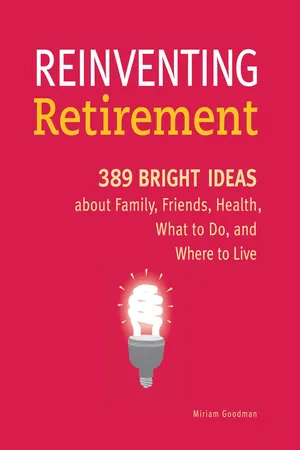![]()
Work
Start Me Up
The word “retirement” brings so much emotional baggage with it that millions of otherwise open-minded, self-aware people immediately change the subject whenever it comes up. Whether it means they have to deal with the reality of aging, that their career is ending and they didn’t quite get where they wanted, or that now they can no longer look to anyone else to make decisions for them (or blame decisions on them), millions of baby boomers are confronting the end of “work” with confusion and apprehension.
So, you aren’t going to work anymore … or you aren’t going to work for money … or you aren’t going to work as many hours as you have been working. In other words, you are leaving the traditional, Monday-through-Friday world of work and entering the world of retirement. But hold on a minute. It is not as easy as walking from one room to the next. It is truly a major change in your life, comparable to any other transition you have made that led you to unexpected, scary, and unknown regions—but this time you are probably doing it alone.
Remember that first day of school? Your parents, and perhaps even your grandparents or older siblings, prepared you for it days, weeks, and months in advance. They told you how exciting it would be, how you would begin the process of learning, and how you would make new friends, be exposed to exciting new opportunities, and have teachers and other nice people guide you through it all. Well, retirement is like that new experience, except that this time there are no teachers or helpers. When it comes to retirement, no one is waiting at the door to help you feel comfortable that first day. You may have come a long way, but this time you are on your own.
Wouldn’t it be wonderful if government, schools, or community groups had some kind of retirement preparedness program? After all, we have preschool to get us ready for real school, so why not have something similar for this important phase of our lives? Just like that first day of school, having it come too early, or without the proper preparation, can bring on anxiety, depression, or the adult version of a temper tantrum. But until that kind of preparedness program becomes universal, each of us will have to take responsibility for making our retirement a positive experience. That’s why planning, communication, and having a feeling of control over timing and transition are so important.
What does retirement mean to you? Perhaps you first have to ask yourself what your work means to you. In letting go of work, what is it that you are releasing? Is it your source of income? Is it also your social network? Is it your identity? Has your work always been something you looked forward to every day, bounding out of bed each morning to go out and accomplish things that made you feel valuable and valued? Do you feel that you contributed to society? Was your work fulfilling? You don’t need to have been a brain surgeon or a firefighter to have done important work—it’s just important that the work had meaning for you. If so, your transition to retirement should be pleasant.
Eight Days a Week
On the other hand, if your work is or was “just a job” to you, your reaction to retirement may be one of relief. Perhaps you spent your working life in a career that you disliked, or one that you inherited, such as a family business you were expected to love. Or maybe you took a job early on because you needed the money, and then inertia or golden handcuffs kept you there. Forty years later you were still working at a job you had planned to leave long ago. Or possibly you consider yourself an artist at heart, but your parents pressured you to do something they considered more legitimate. Hey, now’s your chance to let that artist out, try that other career, or start something new. Retirement can open any door you choose, and it doesn’t have to lead to the Early Bird Special. It is truly up to you and your attitude.
Whether you love or hate your job, it does provide a purpose in your life, structure for your days, and, in most cases, a social community. Retirement can often mean an end to each of these things, so it is important that you concentrate on replacing them as soon as possible. Purpose (or even a passion), structure (even if it is a loose arrangement of classes and meetings and vacations), and a social network of friends will help you make the transition, and indeed your overall retirement, truly successful.
Don’t Know Much About History
Retirement itself is a relatively new phenomenon. Throughout history, people have faced uncertainties brought on by unemployment, illness, disability, and old age. To provide for themselves in times of future need, the ancient Greeks stockpiled olive oil for trade. In medieval Europe, serfs had economic security only as long as they were fit enough to perform labor. As the basis of society changed from farms to cities, formal organizations were created in order to protect the economic security of their members as they grew too old to work. In the Middle Ages, workers with common trades banded together to form mutual aid societies, or guilds. These provided a range of benefits, including financial help. Around the time of the Industrial Revolution, the guilds evolved into modern trade unions and continued providing aid to their members.
One of the first to propose a scheme for retirement security in the United States was Revolutionary War figure Thomas Paine. The guy we all learned about in school wrote a pamphlet in 1795 dealing with retirement income. Titled Agrarian Justice, it called for a ten percent inheritance tax to create a special fund that would provide financial security to both young and older adults. From this fund, a one-time stipend of fifteen pounds sterling would be paid to each citizen turning twenty-one, to give them a start in life, and annual benefits of ten pounds sterling would be paid to every person age fifty and older, to guard against poverty in old age. (Obviously, no one took him up on it.)
In the mid-1800s, following the Civil War, widows, orphans, and veterans were the first to benefit from an aid program instituted by the government. But as the United States found itself deep in the Depression in the 1930s, it was clear something had to be done on a larger scale. The traditional sources of economic security, like farm labor, family, and charity, were no longer effective. The move from farms to towns, the loss of the extended family, and the increase in life expectancy had changed how people spent their later years. In 1935, President Franklin Roosevelt chose the social insurance approach to deal with the problem. The new program, Social Security, addressed the issue of economic security for seniors through a system in which workers and employers contributed money toward their own retirement by making regular payments into a joint fund. This was a giant step toward acknowledging that people in the workforce deserve support even after they stop working.
Ironically, it seems that as soon as we figured out how to pay for retirement, we started putting it off. The last fifty years have been about shortening the workweek, mandating more vacation days, and moving established holidays around so there would be guaranteed three-day weekends. Some companies now even offer employees days off for birthdays or holidays like Cinco de Mayo or Columbus Day. Yet it turns out we are working more years than ever before. Although Social Security regulations were changed in the 1960s so that people could begin collecting some benefits at age sixty-two, late in the twentieth century they were changed again to make the minimum age for full benefits sixty-six or sixty-seven. There’s a conflicting message here—your government wants you to have more vacation time, but it also wants you to work longer.
(I Can’t Get No) Satisfaction
Many people are surprised to discover that they feel defined by their jobs, and that once they retire they have to look at themselves in a new way. Who will I be if I am not identified as a teacher, a doctor, a nurse, a plumber? It wasn’t so long ago that we were identified as “Tommy’s mother” or “Susie’s father.” Now that we have lost that and our job title, who are we? We may kid ourselves and say we aren’t what we do, that people like us for who we are, but we know the truth. If you have had a position with some prestige or worked at a well-known company, people will treat you differently now that you no longer work there. If your spouse has had a glamorous job, then you’ve been getting a free ride on her or his coattails; once your spouse retires, you are going to lose that benefit as well. Perhaps you were on the A-list for parties just because you worked in television or represented a famous person in a big legal case; maybe your picture often appeared in the newspaper because of your career. Those fringe benefits may disappear once you can no longer pull a few strings for someone’s nephew looking for a job. Maybe the prestige and lifestyle that go with your job mean more to you than you thought. You might find new ways to stay connected to that social scene through volunteer work, professional organizations, or serving on boards, or you might decide it’s not that important to you in the larger scheme of things. If it is important, prepare for the change by seeking a new way of identifying yourself through getting involved in other activities. You don’t want to begin retirement missing that old identity just as you are creating a new one.
Maybe your job is what has differentiated you from others, and you fear you will be lost without it. Possibly a life without deadlines and crises—and the sense of urgency and importance that comes with them—does not even appeal to you right now. The best way to avoid the letdown of leaving a job is to find your next passion, your new interest, and have something you can jump right into after the work phase of your life ends. When strangers or new acquaintances ask you what you “do,” you may suddenly feel that you need to report what you did in order to give yourself legitimacy. Don’t fall into this trap. Say you “do plenty”—you paint, travel, read, visit friends, and bring joy wherever you go. When you are comfortable and confident about being retired, others will see you that way, too.
People who find their identity only in their work often have the hardest time adjusting to a new image of themselves. By preparing yourself for this next phase of your life, you’ll undoubtedly make your transition into retirement easier and more pleasant. Don’t leave your retirement years to chance. Make sure you have something concrete to do, at least for the first few months after you stop working. Otherwise you may find yourself depressed, and, frankly, you won’t be that much fun to be around.
Time Is On My Side
If you have been working for the past thirty or forty years, you know the importance of planning. You’ve prepared for meetings, scheduled appointments, and set up conference calls. You even blocked out your vacation days months in advance. So it is somewhat ironic that baby boomers, a generation of planners, men and women who have moved from paper-based datebooks to the latest electronic PDAs, have generally failed to plan for retirement. Oh, sure, you set up a trust or a 401(k) and maybe even bought a condo near the sea many years ago, but did you really prepare for Life After Work?
In your planning, keep in mind that men and women often have different interests and challenges in retirement. Many men look at the early days of retirement as the time to take care of housekeeping chores they have been avoiding, like cleaning out the garage, fixing the gutters, or remodeling the kitchen themselves. Wake up! There is a good reason you have been putting these things off: You don’t want to do them at all! Seriously, have you ever heard of a man who proudly tells his buddies on Monday how he just spent the weekend reorganizing his closets? Meanwhile, many women revel in the process of reorganizing and spiffing up their home environments and won’t hesitate to share their joy with their friends.
The same gender differences apply to the closing of an office. Many men who once had a support staff still need an office, a secretary, a place to go, and a validation of their rank, even after retirement. They liked it and had a psychological need for it. Women seem to handle the transition from work to retirement differently and need less confirmation that they once had a career. They liked their work too, but, since they were probably involved in other projects outside of work, ...


